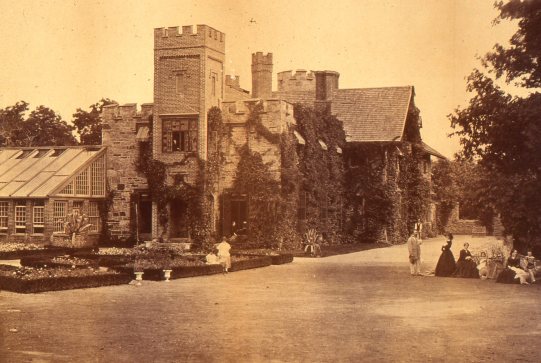April is the twentieth anniversary of National Poetry Month. Please mark your calendars for Poetry in the Parlors on Sunday, April 17, at 4:30 p.m. when BPMM teams up with Four Way Books to present readings by poet Rachel Eliza Griffiths from her 2015 book Lighting the Shadow and novelist and poet Victoria Redel from her work Make Me Do Things. Reception with a book signing afterwards. Registration requested. Cost $10 adults; $8 seniors and students

William Rickarby Miller (1818–1893), Woodland Path at the Priory, 1856
And in the Pelham woods you meet
With boulders black and gray
And moss-grown stones form many a seat
For those who thither stray.
Caroline May, “Pelham Woods,” Lays of Memory and Affection, 1888

William Rickarby Miller, Pelham Priory, 1856

Schoolhouse at Christ Church, Pelham
The Boltons of Pelham Priory were Bartow neighbors known for their artistic, theological, educational, and literary accomplishments during the nineteenth century in America and England. The children in this imaginative family began writing at home, as in many literary households. Their collaborative family newspaper, The Pelham Chronicle, was penned starting in the late 1830s. Each issue concluded with a “Poet’s Corner,” which later formed the basis of The Harp of Pelham (1844), a book of verse that was sold to raise funds to build a neighborhood schoolhouse (still extant today on the grounds of Christ Church, Pelham). The works are in turn comic, sentimental, philosophical, pastoral, narrative, and religious—in short, the range is as large as the number of sibling authors.

“The Musketoe Hunt: A Parody” in The Harp of Pelham is based on Charles Wolfe’s well-known poem about the Peninsular War, “The Burial of Sir John Moore at Corunna” (1817).
Caroline May (ca. 1820–1895) was an English-born teacher at the Boltons’ school for young ladies, which was in operation from the early 1840s to 1881. She was also a poet, editor, essayist, and artist, and some of her poetical works describe the Priory and its circle. In “Lines (Written by Request for Some Pupils Leaving School at the Priory),” she wrote:
Soon will ye leave the Priory walls,
Where ye have spent such busy days
Of discipline, and studious pleasure;
Heard the old bell ring through the walls
For morning work, or evening praise,
Or night’s repose, a well-earned treasure.
Caroline May, “Lines,” Lays of Memory and Affection, 1888
No doubt students at the school were inspired by the same muses as their teachers, and the Pelham Priory would have been a fittingly romantic setting for its resident poets.

Pelham Priory with family members, ca. 1860
In 1848, in her late twenties, Caroline May published The American Female Poets, one of three similar anthologies that appeared in 1848–49, when there was a plethora of women poets, a rapidly developing American poetic tradition, and an enthusiastic market for verse. The other anthologies—both edited by men and entitled The Female Poets of America—were by Rufus W. Griswold and Thomas Buchanan Read. Editors often excluded women from general poetry collections because their work was considered too sentimental and less serious than men’s writing. Subsequently, Miss May published several volumes of her own poems, exploring themes like nature, religion, personal relationships, and women’s experiences.

Poetry books by Caroline May: American Female Poets (1848), Hymns on the Collects (1872), and The Woodbine (1851)

William Jay Bolton, “Sacred Sorrow,” from The Woodbine

Caroline May, The Woodbine, 1851

Nanette Bolton (1815–1884)
May’s poetry reveals that she was a close friend of the Boltons, including Nanette and Adele, the sisters who ran the Priory school after their parents returned to England in 1850. The three deeply religious clergymen’s daughters had many things in common, including their charitable work at the Civil War hospital on David’s Island in New Rochelle, which inspired Caroline May’s elegiac lament:
Civil War has wrought the change;
Hark the tattoo of the drums,
Or the bugle’s shrilly range,
When the morn or evening comes!
See the lines of gleaming walls,
Soldier’s tents and hospitals!
Visit David’s Island now,
And in those pavilions white
You will feel your spirit bow
With strange sorrow, at the sight
Of the many sorts of pain
Horrid war brings in its train.
Caroline May, “David’s Island,” Poems, 1865
By 1881, Nanette Bolton was in poor health. She closed the Priory school and went to Europe, where she died in Sepey, Switzerland, in the summer of 1884. Caroline May memorialized her friend in “From Alpine Heights to Heavenly” (1888): “And oft she said, ‘Oh would it not be grand to go to heaven from here!’”
Margaret Highland, Historian


Pingback: Index | mansion musings